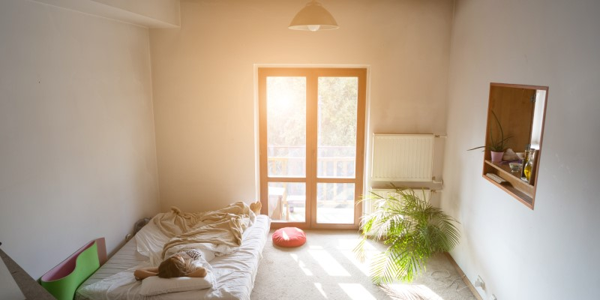As cities evolve and digital opportunities grow, more people adopt an urban nomad lifestyle. These individuals choose to live with less, relying on minimal possessions while embracing the flexibility to move between cities. This lifestyle shift allows them to experience new urban landscapes without being tied down by long-term commitments or extensive collections of material goods. Let's explore how urban nomads embrace minimalism and mobility, adapt to city life, and handle the challenges of this modern living approach.
Minimalism is at the heart of the urban nomad lifestyle. Urban nomads prioritize experiences over possessions, focusing on what they need rather than want. This shift in mindset leads to lighter living, allowing them to pack up and move from city to city without much effort.

Minimalism in cities differs from traditional minimalist living in rural or suburban areas. In urban settings, the limited living space naturally encourages a minimalist approach. Apartments are often smaller, making it essential for urban nomads to be mindful of what they bring into their homes. Essentials such as portable electronics, practical clothing, and multifunctional tools become crucial.
This minimalism means something other than sacrificing comfort. Many urban nomads find that living with fewer belongings can enhance their quality of life. Without the burden of excess possessions, they can focus more on experiences—enjoying a city's cultural offerings or exploring local neighbourhoods.
One of the main appeals of the urban nomad lifestyle is its mobility. Instead of being rooted in one location, urban nomads can move between cities as opportunities arise. Whether it's following a job, seeking out new experiences, or simply craving a change of scenery, mobility is a cornerstone of their way of life.
Urban nomads embrace flexible living through short-term rentals, co-living spaces, and house-sitting, avoiding long-term commitments. Platforms like Airbnb simplify finding temporary accommodations, while the rise of remote work enables professionals to live and work from anywhere. With freelance jobs and digital work, urban nomads use coffee shops, coworking spaces, and libraries as offices, combining career mobility with affordable, adaptable housing options.
Urban nomads often find that frequent moves lead to deeper connections with new people in each city, from coworkers to neighbours. Their mobility fosters openness to forming bonds outside of fixed social circles. Additionally, technology is critical in maintaining relationships with friends and family across distances. Video calls, social media, and messaging apps allow them to stay connected despite their transient lifestyle and different time zones.

Sustainability is another significant aspect of the urban nomad lifestyle. Urban nomads inherently reduce their environmental footprint by living minimally and consuming less. Their focus on essential items and sustainable practices aligns with minimalist principles and supports eco-friendly living.
Urban nomads often choose quality over quantity when it comes to their belongings. Instead of buying cheap, disposable items, they invest in durable products that last longer and serve multiple purposes. This approach minimizes waste and contributes to a more sustainable lifestyle. Additionally, urban nomads are more likely to adopt sharing economies—such as renting, borrowing, or sharing resources—rather than purchasing new items for every city they move to.
City living is generally more energy-efficient than suburban or rural living, especially with a minimalist lifestyle. Urban nomads usually reside in smaller spaces, reducing the energy needed for heating, cooling, and upkeep. Furthermore, many cities offer comprehensive public transportation systems, allowing urban nomads to reduce their car reliance. Public transport, cycling, or walking help lower carbon emissions and support a more sustainable way around the city.

Though the urban nomad lifestyle has many advantages, it also brings specific challenges that must be tackled. These challenges range from logistical issues to emotional and social adjustments, but many urban nomads find ways to overcome them with careful planning and a flexible mindset.
One of the main hurdles for urban nomads is managing finances. Moving between cities can be expensive, especially considering housing, transportation, and everyday living costs. Urban nomads must often carefully budget their finances, balancing the desire for new experiences with the reality of variable expenses.
Short-term rentals, while convenient, can be more expensive than traditional leases. Urban nomads often use off-peak rental seasons, loyalty programs, and local deals to mitigate this. Some may even barter their skills in exchange for accommodations or other services, allowing them to reduce costs while building connections in new cities.

Another common challenge is maintaining a stable work-life balance. Urban nomads, particularly those in freelance or remote jobs, may struggle to separate work from leisure when constantly moving. To avoid burnout, many nomads establish routines that create a sense of stability in their otherwise fluid lifestyle. This might include setting specific working hours, dedicating spaces for work and relaxation, or taking regular breaks to explore the city and recharge.
Living in different cities also means dealing with various bureaucratic systems. Each location has its own set of rules, regulations, and administrative tasks. From registering with local authorities to understanding tax obligations, urban nomads must navigate complex legal frameworks.
Many urban nomads use local resources, such as community centres, expat groups, or online forums, to make this easier. These networks provide valuable information and support for dealing with local bureaucracy, allowing nomads to focus more on their experiences in each city rather than getting bogged down by paperwork.

The urban nomad lifestyle represents a modern approach to living that values experiences, flexibility, and sustainability over material possessions. By embracing minimalism, urban nomads can move freely between cities, maintaining a lifestyle that aligns with their values and urban living demands.
While there are challenges to overcome, such as financial management, work-life balance, and navigating bureaucracy, the benefits of mobility, connection, and sustainability make this lifestyle increasingly appealing in today’s fast-paced world. Whether driven by a desire for freedom or a commitment to sustainable living, urban nomads are redefining what it means to live and thrive in modern cities.


